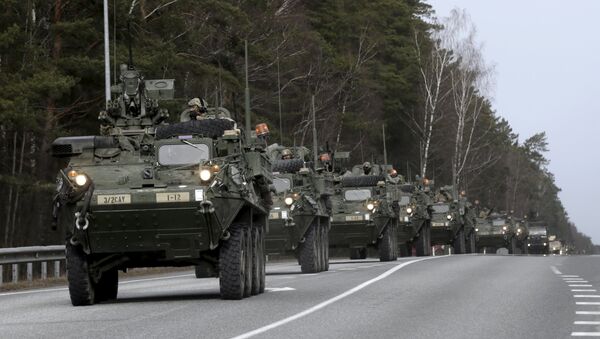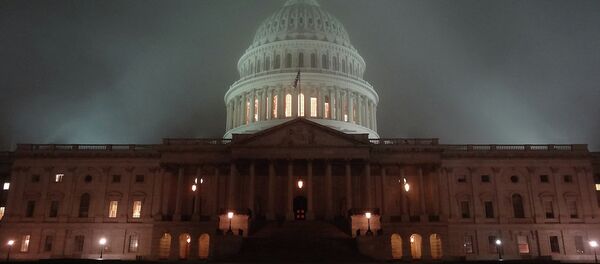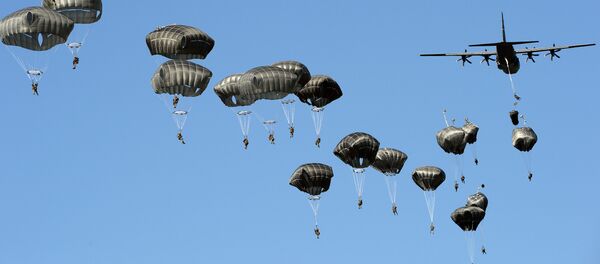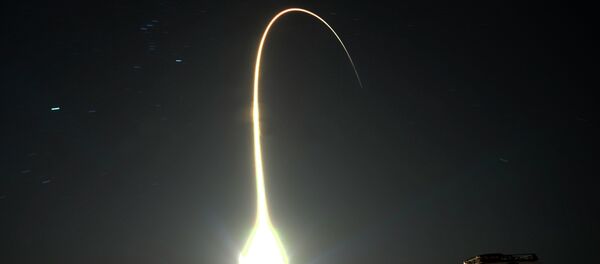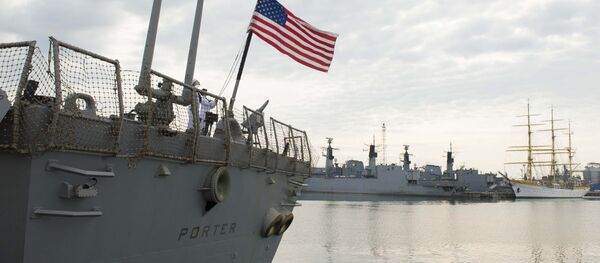On Monday, NATO Secretary General Jens Stoltenberg confirmed that NATO will deploy four 'robust' international battalions to Poland and the Baltic states to counter fears of 'Russian aggression.'
The program, to be agreed to by NATO leaders at the July 8-9 summit in Warsaw, calls for permanent bases along Russia’s border, with nearly 4,000 permanently-stationed troops to function as a "tripwire," and an additional 40,000-troop NATO Response Force that can be deployed into combat within days.
NATO’s plans to establish a permanent force along Russia’s eastern flank, a violation of the 1997 NATO-Russia Founding Act, has been viewed by Moscow as the latest provocative measure by a Western alliance that gives every appearance of clamoring for a return to the Cold War.
The ramp-up follows the unprecedented Anaconda-2016 war games in Poland, featuring over 30,000 troops, led by German forces on the 75th anniversary of the Nazi invasion of the Soviet Union.
Both Poland and Romania have been leading the charge for NATO expansionism along Russia’s border, claiming that regional security is in peril following violent political unrest in Ukraine. Both Warsaw and Bucharest are demanding a troop presence and calling for missile-defense shields.
Polish and Romanian leaders have aptly employed Russophobic rhetoric to strengthen their domestic hand and also look to benefit their national economies by garnering increased military investments to create local jobs.
One year ago, as the drumbeats of the new Cold War began, Russian President Vladimir Putin cautioned that "some countries are simply taking advantage of people’s fears with regard to Russia and they just want to play the role of front-line countries that should receive some supplementary military, economic, financial or some other aid."
President Putin went on to blast the ‘Russian aggression’ talking point, saying, "I think that only an insane person and only in a dream can imagine that Russia would suddenly attack NATO."
Nonetheless, Moscow now faces an increasing military buildup on their borders, by NATO leaders with either designs to incite conflict or profound misconceptions about Russia’s intentions.
On Wednesday, Radio Sputnik interviewed foreign policy analyst Dr. Martin McCauley to discuss NATO’s inflammatory posture toward Russia and what it holds for the future.
"From the American point of view, they would like NATO to have a more expansive global role and to be able to get member states to spend more of their own money," said Dr. McCauley. "The other members are reluctant to spend more, despite US calls for each country to put forward at least 2% of their GDP for defense."
The analyst stated that most European member states remain content with allowing the United States to foot the bill, allowing for national funds to be used for domestic, economic, and political concerns. Currently, only Britain has committed to spending 2% of their GDP on defense, whereas other key NATO allies, like Germany, contribute less than 1.3% of their economic output to the alliance.
How are European countries responding to calls to increase defense spending?
"If you look at Estonia, Lithuania, and Poland, they are the countries calling for more investment and a greater NATO presence, leading to the permanent battalions of 4000 troops to be stationed on Russia border," said the analyst. "These countries are also calling for a total force of 40,000 later on, which almost certainly will be confirmed during the NATO summit in Warsaw next month."
"The big question is, who is going to pay for this?" asked Dr. McCauley. He observed that both Eastern and Western Europeans intend to spend as little as possible on defense, while relying almost solely on American military beneficence, but the status quo has been disrupted by Republican frontrunner Donald Trump’s arguments that, "America has spent too much money already and that NATO is past its sell-by date so it is up to Europeans to spend more."
Dr. McCauley suggested that there is a sharp divide among European countries on whether Russia poses enough of a threat to justify a significant increase in defense spending, with countries like the Czech Republic, Slovakia, and Hungary arguing that there is no risk of Russian invasion and no justification for the expenditures, while Poland and the Baltic states claim that Moscow presents an immediate threat.
The analyst posited that the United States and Poland will likely be forced to increase their defense spending disproportionately, as they will have a hard time convincing Europeans of 'Russian aggression.'
Dr. McCauley pointed out that protests against NATO deployments in Greece, a country in a fiscal crisis, are a result of military spending increases that have forced drastic cuts to domestic necessities. The analyst expects similar uprisings across Europe for the same reasons, as the EU economy faces additional shocks in years to come

